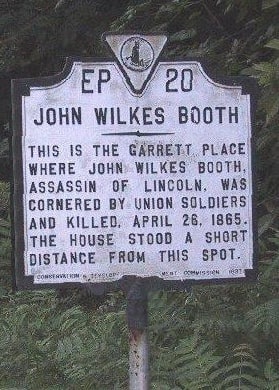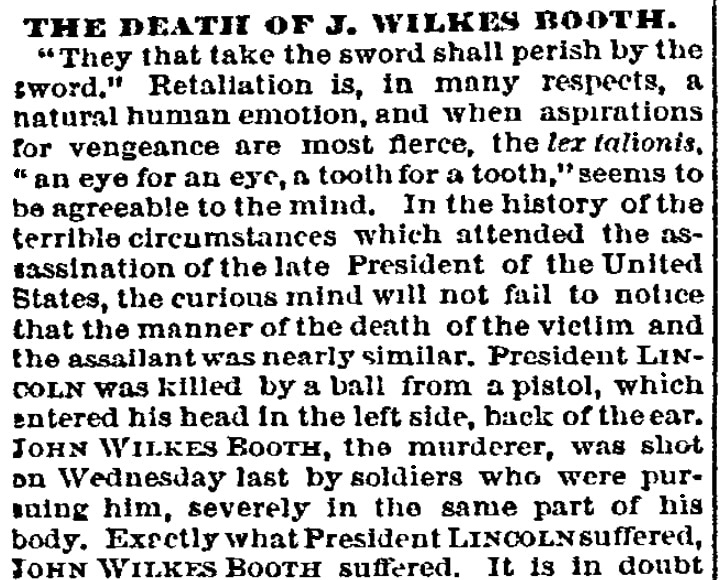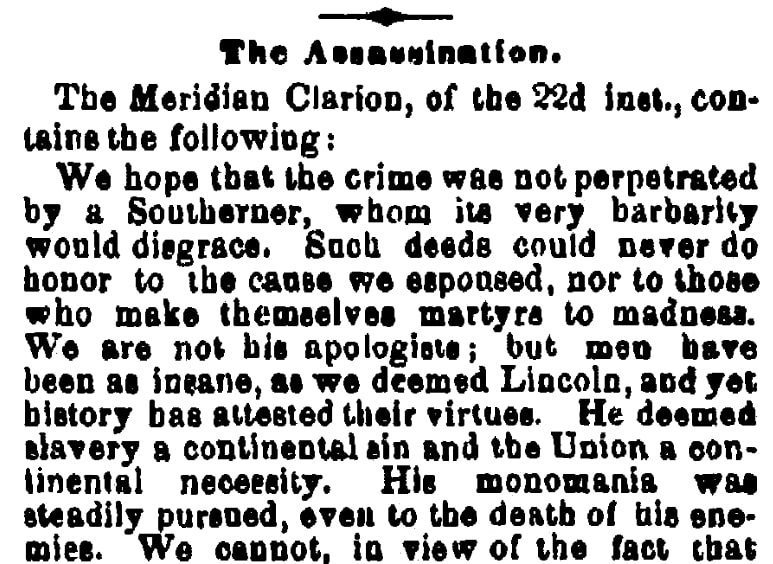The assassination of President Abraham Lincoln on 14 April 1865 by John Wilkes Booth, a 26-year-old actor and fervent Southern sympathizer, shocked and saddened the North. This same reaction was felt by many in the South as well – no American president had ever been assassinated before (although an attempt was made on the life of Andrew Jackson in 1835).

Just five days prior to Lincoln’s assassination, Confederate General Robert E. Lee had surrendered the Army of Northern Virginia, and it was apparent the nation’s bloody four-year nightmare, the Civil War, was at last coming to an end. Just as the nation was beginning to turn its thoughts beyond war to reconciliation and reconstruction, the president who was to lead the way was suddenly gone.

After a furious 12-day manhunt Booth himself was shot dead on 26 April 1865, after being discovered hiding in a barn in northern Virginia. Two days later, the following newspaper editorials were published, one by a Northern paper and one by a Southern, both lamenting the death of Lincoln and castigating Booth.

Here is a transcription of this article:
THE DEATH OF J. WILKES BOOTH.
“They that take the sword shall perish by the sword.” Retaliation is, in many respects, a natural human emotion, and when aspirations for vengeance are most fierce, the lex talionis, “an eye for an eye, a tooth for a tooth,” seems to be agreeable to the mind. In the history of the terrible circumstances which attended the assassination of the late President of the United States, the curious mind will not fail to notice that the manner of the death of the victim and the assailant was nearly similar. President Lincoln was killed by a ball from a pistol, which entered his head in the left side, back of the ear. John Wilkes Booth, the murderer, was shot on Wednesday last by soldiers who were pursuing him, severely in the same part of his body. Exactly what President Lincoln suffered, John Wilkes Booth suffered. It is in doubt from conflicting statements, whether he was sensible after he was shot. If he was not he expired as his victim expired. If he was, he endured in those two hours terrible tortures.
In the manner of their taking off there was much similarity, but in their mental conditions at the time of death the dissimilarity was great. The President was in a happy condition of mind; the prospects of the country were cheering to him; he had hope of speedy peace; his heart overflowed with good will and kindness. At the moment of death he was enjoying the relaxation of the scene; his mind was cheerful; and his heart free from other than pleasurable emotions. The swift course of the bullet deprived him of consciousness, without warning, and it is not likely he ever knew the cause which deprived him of self-control. Take, on the other hand, the circumstances attending the subsequent career of the assassin. The moment of the murder was the only minute of happiness or exultation which he could have experienced. With the theatrical flourish of his knife, and the exclamation, sic semper tyrannis, his transitory joy ceased. Agitation, anxiety, the fear of pursuit followed.
In the long journey which succeeded, the precautions necessary to evade pursuit, the disguises assumed, the subterfuges resorted to, the concealments which were necessary, the assassin endured intense misery, knowing that the hue and cry would follow him wherever he should go, having cause of suspicion of each man who approached him, and bearing beside in his conscience the fearful curse of Cain. There were crowded in the twelve days which had elapsed since the assassination at Ford’s Theatre, emotions, thoughts and remorse equal to a lifetime of misery. Whilst it was the will of God that Abraham Lincoln should be removed from this life when his heart was lightest, and his hopes for the future were assuming pleasing shapes, it was also His will that John Wilkes Booth should be taken off after suffering, of a mental nature, which make of earth a hell.
The one was taken away like a flower suddenly plucked from the stem. The other was crushed like a wounded scorpion, stinging itself to death and expiring amid its fury by an enemy’s blow. The circumstances of the assassination and the punishment are remarkable, and prove the mysteries of Providence. There are many who would have preferred that the murderer should have died by the hands of the law, and they lament that the gallows has lost a victim. But the retribution has been remarkable, the retaliation for the crime almost identical with the incidents of its perpetration.
The capture of Harold (co-conspirator David Herold – ed.) is regarded by the Government as important. What his precise connection was with the crime is not generally known. He was, we presume, an accessory before the fact, and possibly one of the principals in the great conspiracy.
The Southern press editorialized about John Wilkes Booth as well. This article was published by the Meridian Clarion on April 22, before Booth’s capture, and reprinted by the Times-Picayune.

Here is a transcription of this article:
The Assassination.
The Meridian Clarion, of the 22nd inst., contains the following:
We hope that the crime was not perpetrated by a Southerner, whom its very barbarity would disgrace. Such deeds could never do honor to the cause we espoused, nor to those who make themselves martyrs to madness. We are not his apologists; but men have been as insane, as we deemed Lincoln, and yet history has attested their virtues. He deemed slavery a continental sin and the Union a continental necessity. His monomania was steadily pursued, even to the death of his enemies. We cannot, in view of the fact that Johnson must be his successor, approve the sentiments of those who make a crime, at the bare recital of which chivalrous courage shudders, the subject matter of rejoicing.
A previous number of the same paper says:
Wilkes Booth, we are told, was an actor in the Richmond Theatre. He is said to be an illegitimate son of the great tragedian. We regret the truth of this story, if it be truth. We deem the independence of the South eminently desirable, but never dreamed that it was to be achieved by assassins. Providence rarely rewards crimes against which humanity revolts, with the greatest blessings of which humanity dreams.
Note: An online collection of newspapers, such as GenealogyBank’s Historical Newspaper Archives, is not only a great way to learn about the lives of your ancestors – the old newspaper articles also help you understand American history and the times your ancestors lived in, and the news they talked about and read in their local papers.
Related Articles:
